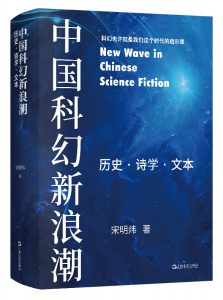
Song Mingwei
Shanghai Literature and Art Publishing House, 2020
Reviewed by Shanky Chandra (Harvard-Yenching Institute Visiting Fellow)
Professor Mingwei Song is one of the founders of Chinese science fiction studies in the United States and an internationally renowned scholar. New Wave in Chinese Science Fiction, a collection of twenty essays by Professor Song, was published in 2020. In a deeper theoretical research dimension, this book uses rich text cases combined with in-depth reading to answer the questions regarding the course of development, classification, and practical significance in the context of Chinese discourse when reading science fiction works. This book helps us better interpret science fiction, as well as to think about the present, and understand the future.
In addition to exploring the above profound issues, New Wave in Chinese Science Fiction is also committed to discovering and presenting outstanding young Chinese sci-fi writers. For example, many young sci-fi creators such as Chen Qiufan, Fei Dao, Baoshu, Chi Hui, Pan Haitian, and Xia Jia are mentioned along with their works. Professor Song places them in the context of the overall development of Chinese sci-fi. While trying to change the erroneous stereotypes of ordinary readers of science fiction as “the weakest part of literature,” the book also provides an in-depth and enigmatic understanding of the rapid development of Chinese science fiction, particularly since the post-90s era, and especially after Liu Cixin’s “Three-Body Problem” won the Hugo Award, the world’s highest award for science fiction.
The “New Wave in Chinese Science Fiction” contains more than 20 related papers and essays that have had the most influence in the past ten years. It is about 160,000 characters long and aims to establish new academic heights for China’s science fiction research. The book is divided into four parts: “Genesis” (创世纪), “Explore the Space of Science Fiction Poetics”(科幻诗学空间的开拓), “Archaeology and Futurology” (考古学与未来学) and “The Broadcasting Era of Chinese Science Fiction”(中国科幻的广播时代). The most exciting chapters include the 2011 article on the Star-pluckers and Wall-facers in Liu Cixin’s “Three-Body” series. This book has provided one of the best analyses of Liu Cixin’s works, especially about “The Three-Body Problem” can be called “a complete analysis of Liu Cixin’s science fiction reading in history.” In this book, Mingwei Song’s academic writing has a clear and straightforward style. It tackles essential questions such as “how to choose suitable science fiction works for reading and teaching?”, “how to interpret the connection between science fiction literature and individuals, society, and the problems that need to be solved urgently in current science fiction reading and teaching?” and “Do people need science fiction?”
Through analyzing the writings of Chinese science fiction writers such as Han Song, Liu Cixin, Chen Qiufan, Fei Dao, Baoshu, Chi Hui, Pan Haitian, and Xia Jia, this essay examines how, since the policy of reform and opening of China in 1978, Chinese science fiction has been profoundly and complexly influenced by numerous straining in Chinese (and Western) literary and intellectual thought, an area that scholars of Chinese literature have tended to neglect. This collection of essays on the study of Chinese science fiction literature, which contains many new insights, is the first step to organize China and the world’s science fiction systematically. “New Wave in Chinese Science Fiction” viewpoints proposed by Song Mingwei are more named from the perspective of the subject matter and creation method. The history of Chinese science fiction is indeed unique and strikes a strong contrast in its origins and development to that of Western science fiction. It is a history of different periods, but in the depths of the text, what hides is the continuity of the scientific spirit between modern Chinese history and literature and the continuity between the historical periods. When Chinese pragmatism encounters Western spirit, there must be originality of creative transformation.
As Prof. David Wang said of Prof. Song, “He has spared no effort in promoting science fiction research, not only as a family but even winning the reputation of ‘the godfather’ of science fiction.” Mingwei Song has viewed the world of science fiction with poetic passion and agility, and is able to “render visible the invisible.” Professor Song has been tirelessly researching, discovering, and compiling outstanding sci-fi works and combining theoretical creativity to create science fiction poetics with Chinese characteristics. His dedication and enthusiasm for this field can be seen in “The New Wave in Chinese Science Fiction: History, Poetics, and Text” very profoundly.
